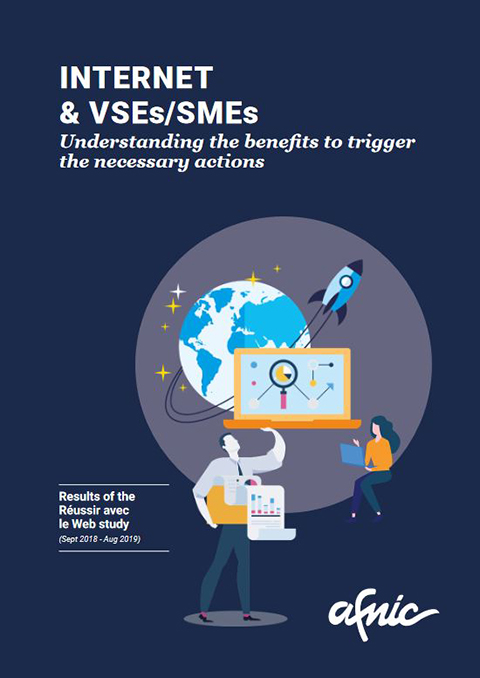
Afnic – the association responsible for .fr domain names – today unveiled the results of its Réussir avec le Web (‘Succeed with the Web’) study analysing the online presence of over 3,000 VSEs and SMEs throughout the country. This is indicative of a strong desire to be online and a keen understanding on the part of these companies of the issues at stake. It also highlights the difficulties experienced in establishing an online presence, associated with a lack of human and sometimes financial resources and the difficulty of assessing the potential return on investment, resulting in a greater presence on social networks than in the form of a website.
- 70% of VSE/SME managers believe that having a website and/or being present on social networks is vital to their business, with 22% considering it to be useful.
- Nearly two-thirds of VSEs/SMEs (63%) spend less than €300/year on their online presence and 24% between €300 and €1,000/year.
- VSEs/SMEs have a greater presence on social networks (76%) than via a website (69%), despite the fact that a website would allow them to be independent and develop their business strategies.
Online presence: a commercial driving force acknowledged by VSEs and SMEs
Afnic has been devoting part of its operations to supporting VSEs and SMEs for a number of years now with a view to helping them achieve an effective and controlled online presence (17,000 companies involved in such initiatives in 2019 alone via Foliweb workshops and training provided in 30 cities and the Réussir-en.fr advice platform). The opportunity to gather data published today. One of the key lessons learned related to the importance placed on online presence:
Having a website and/or a presence on social networks is now essential where managers of VSEs and SMEs are concerned, with 70% of them believing it to be vital to their business and 22% considering it to be useful.
They are 4 benefits, as far as they are concerned: presenting their business (63%), being easy to find (48%), communicating with their customers and prospective customers (40%) and selling their products and services online (36%). “For a hairdresser, for example, being visible on an online map and having a website displaying opening hours and prices, or even an appointment booking system, are undeniable advantages when it comes to standing out and attracting new customers”, explains Afnic CEO Director Pierre Bonis.
VSEs and SMEs on social networks place slightly greater importance than those with a website on communicating with customers (22% as opposed to 19%) and being easily found (26% as opposed to 23%). Those with a website, on the other hand, clearly have an interest in online sales (26% as opposed to 19% for those on social networks).
“We can see here the different opportunities that these two means of communication provide; if the aim for a VSE or SME is to be visible, social networks would appear to be more appropriate, especially since they are not subjected to the constraints and risks associated with SEO. If the aim is to establish a commercial relationship, however, then a website is clearly the more popular choice. In reality, though, VSEs and SMEs have a stronger presence on social networks (76%) than through a website (69%). Contrary to popular belief, social networks alone are not enough”, Pierre Bonis adds.
The study shows that many VSEs and SMEs that are only present on social networks would benefit from having a website, without necessarily doing away with their current system. At the same time, some VSEs and SMEs use their websites as social networks, unaware of all the potential business opportunities that they present.
“Companies that are only present on social networks are platform-dependent and this reliance is unhealthy. That said, the two are certainly not incompatible. It’s difficult today, for example, for a hotel to be visible if it isn’t listed on Booking.com, but having a presence on this site provides a gateway to its own website offering exclusive rates and services. We are making VSEs and SMEs aware of the need to create their own website in order to guarantee their independence via our Foliweb workshops and the Réussir-en.fr platform”, Pierre Bonis explains.
The obstacles and questions facing company managers
Online presence comes at a cost, even if this is often low compared to other forms of advertising investment. Furthermore, only a third of the VSEs and SMEs questioned used online advertising, by purchasing either advertising on social networks (26%), sponsored links on search engines (10%) or banners on high-traffic sites (3%).
Almost two-thirds of them (63%) spent less than €300/year on their online presence, with 24% spending between €300 and €1,000/year. Over and above the cost aspect, though, it is a lack of time that hampers small businesses’ ambitions for their online presence, with half of them spending minimal time on it – no more than an hour a week (33%), an hour a month (13%) or even an hour a year (3%)! In fact, only 9% of them said they posted content on their websites every day and 29% once a week.
Most importantly of all, it is difficult for them to determine the return on investment that the required financial and human resources will yield, with almost half of VSE and SME managers (46%) believing that being online is useful to their business but not knowing how to assess its profitability. 21% of them considered it not to be very profitable, while 10% didn’t consider it to be profitable at all.
Here, again, the differences between a social network visibility strategy and a commercial website strategy are clear, with 27% of VSEs and SMEs indicating that they were on social networks claiming that they could not estimate the percentage of their turnover generated through the Internet as opposed to 23% of VSEs and SMEs with a website. On the other hand, 24% of VSEs and SMEs with a website claimed that the Internet accounted for over 50% of their turnover as opposed to 19% of VSEs and SMEs visible through social networks.
Methodology: Data gathered from 3,006 VSE and SME managers via an online questionnaire completed between 1 September 2018 and 31 August 2019
Further readings
About Afnic
Afnic is the acronym for Association Française pour le Nommage Internet en Coopération, the French Network Information Centre. The registry has been appointed by the French government to manage domain names under the .fr Top Level Domain. Afnic also manages the .re (Reunion Island), .pm (Saint-Pierre and Miquelon), .tf (French Southern and Antarctic Territories), .wf (Wallis and Futuna) and .yt (Mayotte) French Overseas TLDs.
In addition to managing French TLDs, Afnic’s role is part of a wider public interest mission, which is to contribute on a daily basis, thanks to the efforts of its teams and its members, to a secure and stable internet, open to innovation and in which the French internet community plays a leading role. As part of that mission, Afnic, a non-profit organization, has committed to devoting 11% of its Revenues from managing .fr Top Level Domain to actions of general interest, in particular by transferring €1.3 million each year to the Afnic Foundation for Digital Solidarity.
Afnic is also the back-end registry for the companies as well as local and regional authorities that have chosen to have their own TLD, such as .paris, .bzh, .alsace, .corsica, .mma, .ovh, .leclerc and .sncf.
Established in 1997 and based in Saint-Quentin-en-Yvelines, Afnic currently has nearly 90 employees.




